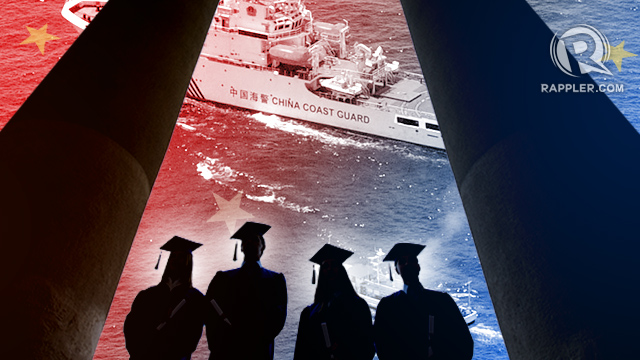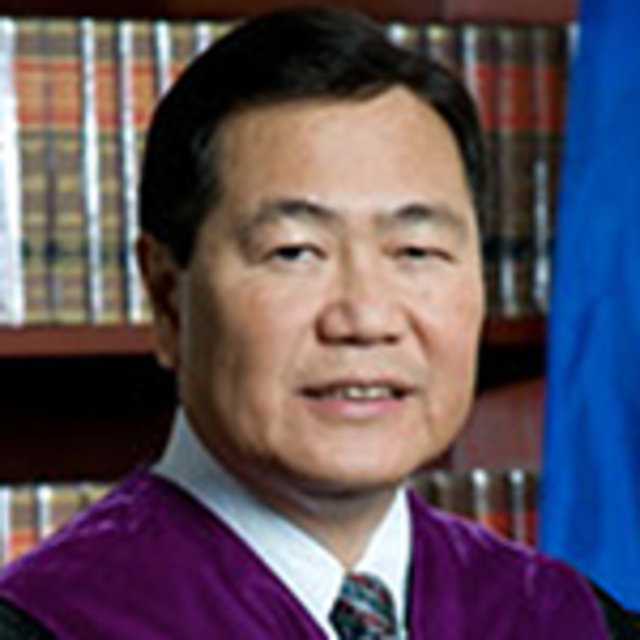

Editor's Note: Supreme Court Senior Associate Justice Antonio Carpio delivered this speech at the University of the Philippines College of Social Sciences and Philosophy for its Recognition Day on Saturday, June 29. Rappler is republishing it with his permission.
Chancellor Michael L. Tan, Dean Maria Bernadette L. Abrera, members of the faculty, students of the College of Social Sciences and Philosophy who are being recognized and honored this morning, their parents, relatives and loved ones, friends, magandang umaga sa inyong lahat.
Let me congratulate all the students being recognized and honored here in this hall. Your perseverance and hard work have brought you to the finish line as you will now graduate from this university to start a new phase in your lives. Many of you will work in the private or public sector, while some of you will start your own businesses. Others will proceed for further studies. There will also be those who will seek work abroad.
Whatever you do, wherever you may go, there is one element that will define you as a person, before your coworkers, before your colleagues in business, before the community, and before the public at large. And that is your personal integrity.
Integrity simply means being consistently honest and truthful in your actions regardless of the consequences, even if it means self-sacrifice on your part. This means doing an act because it is the right thing to do, even if you are alone against many. This means firmly standing by your principles, though the heavens may fall.
It is not easy to be a person of personal integrity, to do what is right, and to stand by your principles, when it is so much easier to simply go with the flow and stay under the radar. So why be a person of personal integrity and make life hard on yourself?
The Constitution expressly requires that all public officials and employees must serve with outmost integrity. In the private sector, employers conduct, in varying degrees, background checks on the personal integrity of an applicant before accepting an applicant for employment.
As you go up the ladder in the public or private sector, you will always be evaluated based on your personal integrity. There will always be objectors against those with questionable personal integrity, while those with known personal integrity will find little or no opposition. Employers will almost always never employ anyone with known questionable integrity no matter how competent the person may be.
In your daily life even as a student, you always evaluate people based on their personal integrity. If a classmate or schoolmate wants to borrow from you, be it money, a book or anything of value, you always ask yourself: can I trust this person to pay me back or to return what he has borrowed? You are actually evaluating the personal integrity of the person.
In banking, there is what is called a character loan. The branch manager may lend you money without any collateral, at low interest, if he knows you have personal integrity. This means the branch manager believes you when you promise to pay the loan on a certain date. You are known as a man of your word.
If you have a questionable personal integrity, the branch manage will most likely not lend you at all. Or if ever he lends you, he will surely require that you put up a collateral – hard assets like land or condominium. And you will most likely be charged a high interest rate for being a credit risk.
In the academe, the worst offense you can possibly commit, in my opinion, is to cheat in exams. Cheating is mental dishonesty. To cheat is the complete opposite of honesty and truthfulness. That is why the penalty for this offense may be dismissal or even expulsion.
If you lose your personal integrity, many doors will close on you. Your friends will be wary of you, your business associates will hesitate to transact with you, your superiors will not trust you, and the public will be skeptical with whatever you say or do. There is a heavy price to pay for losing your personal integrity.
If you lose your personal integrity, it will be a very long and hard climb back to recover your personal integrity, if ever you can recover. You may be able to recover, but the odds may be against you.
That is why you should always protect your personal integrity, and safeguard it like you are safeguarding your very own life. Your personal integrity is your face to the world, it is how the world sees you. Surely, you do not want to present a face that drives people away from you.
Territorial integrity
There is another kind of integrity that is also of utmost concern to all of us Filipino citizens. This is an integrity that you must also protect and safeguard with your own life, if necessary. I am referring to the territorial integrity of our country.
Under the Constitution, our national territory includes submarine areas over which the Philippines exercises jurisdiction, and that includes our exclusive economic zone (EEZ) in the West Philippines Sea.
The Constitution mandates that the State shall protect its marine wealth in its exclusive economic zone. The essential elements of a State are territory, government, people, and sovereignty. The government and the people are the two groups of actors in these 4 essential elements.
The government and the people are the ones tasked to protect the nation's marine wealth in its exclusive economic zone. Thus, the Filipino people, citizens like you and me, have the constitutional and civic duty to protect our territorial integrity in our exclusive economic zone in the West Philippine Sea.
The area of our exclusive economic zone in the West Philippine Sea, as affirmed with finality by the arbitral tribunal at The Hague, is larger than the total land area of all our islands put together. All the fish, oil, gas and other mineral resources in this huge maritime area belong exclusively to the Filipino people.
The Constitution mandates that the "use and enjoyment" of these resources shall be reserved "exclusively" for the Filipino people. The "use and enjoyment" of these resources cannot be shared with, or given away, to foreign nationals.
This exclusivity is not a "thoughtless and senseless" provision in our Constitution as President Rodrigo Duterte has unfortunately characterized. The United Nations Convention on the Law of the Sea or UNCLOS has been ratified by 167 States, including China, representing an overwhelming number of members of the United Nations, accounting for at least nine-tenths of the world's population.
UNCLOS has reserved the use and enjoyment of all the natural resources in all the EEZs of the world exclusively to the respective adjacent coastal states. The framers of our Constitution have incorporated this exclusivity in our Constitution. Even the small minority of states that have not ratified UNCLOS, like the United States of America, have adopted this exclusivity. International tribunals have declared this exclusivity as part of customary international law – which means it is the governing law for all states of the world.
China itself reserves all the natural resources in its own EEZ exclusively to Chinese citizens. Why will we not accept and protect this exclusivity when the rest of the world is accepting and protecting this exclusivity? Surely, this exclusivity in the use and enjoyment of the resources in the EEZs, being the accepted norm in all civilized states of the world without exception, is not "thoughtless and senseless."
We must protect this enormous wealth in our exclusive economic zone in the West Philippine Sea for the benefit not only of the present generation of Filipinos, but also of future generations of Filipinos still to come. It is the duty of this present generation of Filipinos to protect this marine wealth, and hand it over to the next generation of Filipinos, who will also protect it for the next generation of Filipinos after them. This is the intergenerational duty of every generation of Filipinos in protecting our territorial integrity.
My generation has built a strong foundation to protect our territorial integrity in our exclusive economic zone in the West Philippines Sea when the Philippines won in July 2016 the landmark victory at The Hague arbitration. Future generations of Filipinos, including your generation, must build on this foundation.
Defending integrity
Our territorial integrity is just like our personal integrity. We must maintain, protect, and defend both with all the power at our command because they are priceless. To protect our territorial integrity requires doing what is right in service to the Filipino people regardless of the consequences. To protect our territorial integrity requires personal integrity.
If we fail to protect our territorial integrity in the West Philippine Sea and lose it to China, we will lose our exclusive economic zone in the West Philippine Sea forever. There is no recovery once we lose this huge maritime area to China.
If we lose our personal integrity there is still a chance of recovering our personal integrity, no matter how long and difficult it may be. But if we lose our territorial integrity, there can be no recovery unless we defeat a nuclear armed China in a war, which is of course impossible.
War, in the first place, is not an option and has never been an option. Under the Constitution, the Philippines has renounced war as an instrument of national policy. This means the Constitution prohibits the government from going to war to enforce The Hague arbitral ruling.
Besides, the United Nations Charter has outlawed the use or threat of force to settle territorial or maritime disputes between states. A country that violates this is an international outcast, and can be sanctioned by the Security Council.
Of course, we also know that if we go to war with China to enforce the arbitral ruling, we will lose and lose badly. Only a fool will go to war with China. It is clear that the specter of war is being raised only to intimidate the Filipino people into submitting to China's encroachment of our EEZ.
The correct recourse is to protect our territorial integrity through the rule of law. That is why when China seized Scarborough Shoal in 2012, we did not send the Philippine marines to retake Scarborough Shoal. We sent our lawyers to The Hague to protect our territorial integrity by invalidating China's 9-dash line before an arbitral tribunal under UNCLOS.
We brought the resolution of the dispute to a forum where warships, warplanes, missiles, and nuclear bombs do not count, and where the dispute would be resolved only in accordance with the rule of law. And we won an overwhelming victory. We thus protected our territorial integrity through the rule of law.
We should therefore continue resorting to the rule of law in protecting our territorial integrity in the West Philippine Sea. We must use the rule of law wisely and creatively, exploring and pushing the limits of international law to maintain our territorial integrity.
So, dear students of this great institution of learning, as you leave the portals of this University, remember to always maintain, defend, and protect your personal integrity and our nation's territorial integrity, and safeguard and uphold them as you would your very own life.
Upholding your personal integrity and our territorial integrity is faithfully adhering to our alma mater’s motto: Honor and Excellence, in everything we do.
Thank you and once again, congratulations to our honorees. Mabuhay ang Republika ng Pilipinas, mabuhay ang Unibersidad ng Pilipinas, mabuhay tayong lahat. – Rappler.com
Images from AFP and Shutterstock